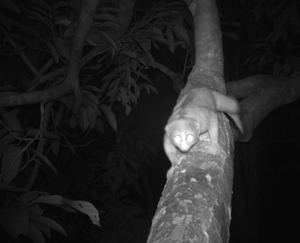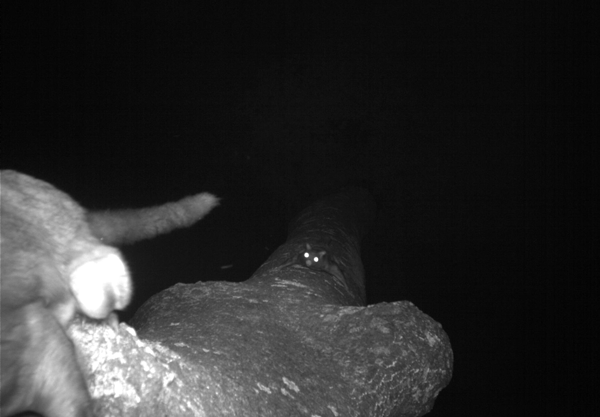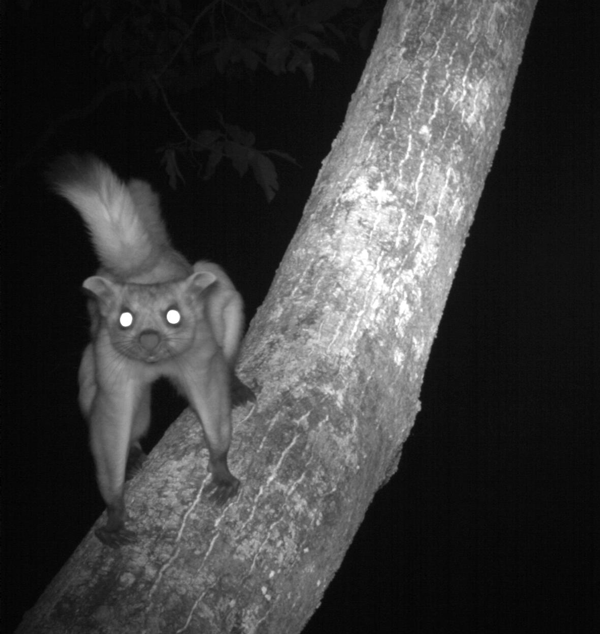What is your educational background and career trajectory?
I studied earth systems for my undergrad and Master’s degrees at Stanford, where I focused mostly on marine ecology. I spent time taking classes at the University of Queensland in Australia and the Hopkins Marine Station in Monterey, and studied the effects of commercial and subsistence fishing on reef shark populations in Kiribati, a country in the central Pacific Ocean. I moved from the reef to the rainforest for my Ph.D. at the Yale School of Forestry. I studied movement ecology and conservation of mammals in tropical forest canopies, which meant I spent a lot of time climbing trees, setting up cameras, and trying to make sense of the decisions animals make as they travel through the treetops.

When I finished grad school, I worked as a film researcher for HHMI’s Tangled Bank Studios, then was awarded a Fulbright-National Geographic Digital Storytelling Fellowship to study canopy wildlife in Malaysian Borneo and the Ecuadorean Amazon and write about life in the field. After that, I continued my research in movement ecology as a postdoc at UC Davis and the Smithsonian Tropical Research Institute in Panama. It’s also worth noting that I grew up in Minnesota, so being so cold for so much of my upbringing definitely influenced my decision to spend the better part of the last decade in the tropics.
What got you interested in science communication?
I started communicating about science because I was lonely in the jungle. As a field scientist, I spent a lot of time away at obscure islands and field stations without a ton of people around. Emails sent home turned into blog posts, which I enhanced with photos, GIFs, videos, and all sorts of other things. The more interesting I made my message, the more I would hear back from people and the less lonely I would feel – it was totally self-serving. Over time, I got more and more interested in figuring out ways to share the world I was in and the people I was with (yes, I eventually made friends) while doing fieldwork. A lot of researchers spend time in weird or remote places, so I liked finding ways to bring those places and experiences back to people who wouldn’t otherwise have access to them.

I’m always excited about different ways to tell stories about wildlife and science, and picking up skills to do it. During my postdoc, I went through this amazing radio production program at KALW in San Francisco called the Audio Academy. One of the highlights of that experience was taking my recording gear into the field with some of my colleagues for a radio story about monkeys that were using stone tools. Doing fieldwork in search of a story rather than to collect data was a refreshing change of pace and really solidified my interest in pursuing full time work in science media production. Although to be clear, I definitely had to also collect data – no dead weight in the field!
What do you do at iBiology?
I am part of the production team for the research talks, which includes inviting speakers, helping to develop and record their presentations. As the lone ecologist in the group, you can bet on me pushing more ecology content in the near future. I’m also working on outreach for our videos, engaging with our audience and getting to know them, and trying out some new ideas surrounding the content we produce. I’m always really curious about the path that led scientists to the field they chose and the questions they were drawn to, so I’m excited to find ways to highlight that through video, audio, or both. It’s an office full of scientists, so everyone is down to experiment a little bit!
What do you like about working at iBiology?
I like that I’m in an environment where everyone sort of gets the career trajectory I’ve been on. We’ve all spent time in research, all grappled with stepping outside of a known path and figuring out a new route to fulfilling work in science. It’s a really motivated, enthusiastic group with an amazing amount of knowledge and a lot of passion for sharing scientists’ stories.
Over the past decade or so I feel like I’ve been picking up experiences and skills here and there, just following what seemed interesting to me at the time. It never felt like a specific plan, and it certainly didn’t always feel like it would amount to anything, I just kept coming across opportunities and projects that sounded fun. In my work at iBiology, it now feels like all of those seemingly disparate projects that split my focus from my research were for a reason. I love that I have an opportunity here to utilize my background and continue to engage with science, all while creating work that is meaningful to me. Oh also, there’s a magical shelf in the office that always has candy no matter how much of it I eat. So that’s pretty good, too.


Follow Kevin on Twitter @mclean_ka





Jiangyue Wang says
WOW! You will never know how excited a student learning ecology was when reading your passage! I am really fascinated by your experience, and waiting for more ecology-related contents in iBiology!!!